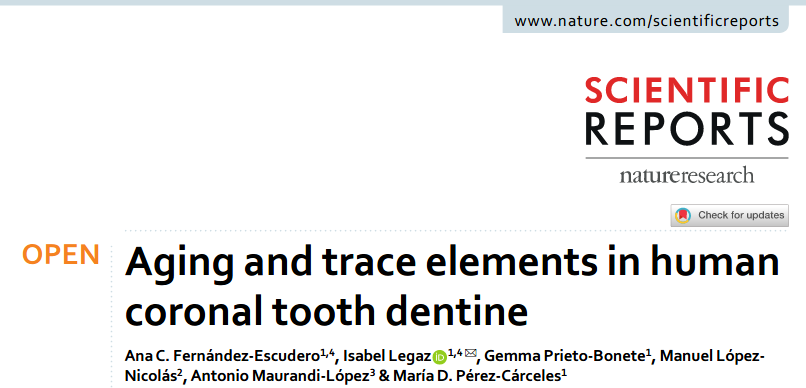Aging and trace elements in human coronal tooth dentine
Published in Scientific Reports, 2020
Recommended citation: Ana C. Férnandez-Escudero, Isabel Legaz, Gemma Prieto-Bonete, Manuel López-Nicolás, Antonio Maurandi-López, María D. Pérez-Cárceles, Aging and trace elements in human coronal tooth dentine, Sci Rep 10, 9964. https://doi.org/10.1038/s41598-020-66472-1. https://www.nature.com/articles/s41598-020-66472-1
Abstract: Teeth are a fundamental tool in forensic odontology for identification in a legal context of those individuals who cannot be identified visually or by other means. Dentine presents physiological exchanges of in trace elements after a period of mineralization and several factors can affect its concentration. The aim of this study was to investigate the concentration of 25 trace elements in the coronal dentine according to sex and type of tooth to determine their relationship with age. A total of 25 trace elements were analyzed in 150 human coronal dentine. Teeth were classified into three age groups, sex and tooth type. The trace elements were grouped as potentially toxic or essential. Inductively Coupled Plasma-Mass Spectrometry and Atomic Emission Spectroscopy were used. The toxic and essential elements were detected in the following order of concentration: Al > Pb > Sn > Li > As > Cd and Ca > P > Mg > Na > S > K > Sr > Zn > Ba > Fe > B > Ti > Mn > Cr > Ni > Cu > Co > Se > V. Our findings show an increase in the concentration of toxic (Pb, Li and Sn) and essential (B, Ba, K, Sr, S and Mg) elements in coronal dentin related to the age of the teeth, regardless of sex. The concentrations of Pb and K in dentin of molars and premolars are the elements that best relate their variations with age. In view of our results, the analysis of these trace elements in dentin in combination with other types of techniques could be established as an element to consider in age dating studies in different forensic situations.
This article is licensed under a Creative Commons Attribution 4.0 International License, which permits use, sharing, adaptation, distribution and reproduction in any medium or format, as long as you give appropriate credit to the original author(s) and the source, provide a link to the Creative Commons license, and indicate if changes were made. The images or other third party material in this article are included in the article’s Creative Commons license, unless indicated otherwise in a credit line to the material. If material is not included in the article’s Creative Commons license and your intended use is not permitted by statutory regulation or exceeds the permitted use, you will need to obtain permission directly from the copyright holder. To view a copy of this license, visit http://creativecommons.org/licenses/by/4.0/.
https://www.nature.com/articles/s41598-020-66472-1.pdf

